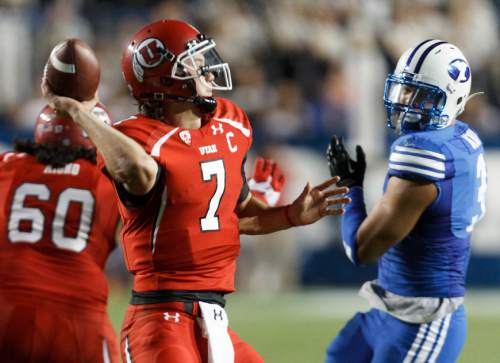This is an archived article that was published on sltrib.com in 2015, and information in the article may be outdated. It is provided only for personal research purposes and may not be reprinted.
Not quite five years ago, when BYU announced its move to football independence, I was skeptical about the school's ability to piece together a schedule, impressed by a six-game agreement with Notre Dame and confident that Utah and BYU could keep playing each other every year.
Overall, BYU has surprised me by scheduling a bunch of big-name opponents, even though the Notre Dame package crumbled after the Cougars' two road games. But maintaining the annual series with Utah obviously has proven to be difficult, with the schools not meeting in 2014 or '15 and questions again surfacing about the future, after the Utes and Cougars play in 2016, '17 and '18.
My latest thoughts about the state of the series, or 10 truths about Utah-BYU:
• The rivalry game absolutely needs to be played as often as possible. Fans on both sides continually compare their program to the other, which validates my belief that people care deeply about the rivalry.
• Can I live with an occasional year off? Well, yes. Last season made me realize that, to a degree. But imagine if the Cougars had kept moving up in the rankings (along with Utah) after their 4-0 start. Everybody would have wanted an on-field resolution, wouldn't they?
• Utah athletic director Chris Hill recognizes the importance of the game in this state.
• The series means more to BYU in its current position than it does to Utah. There's no getting around the fact that Utah's Pac-12 membership changes the dynamic.
• So it makes sense that Hill is unwilling to sacrifice every scheduling consideration for the sake of the rivalry, as he explained in a meeting with the news media this week. I understand his position. Ideally, the Utes and Cougars always would play in September, in most cases prior to the start of Utah's Pac-12 schedule.
• BYU's seemingly wide-open schedule has created complications as well. Most other power-5 schools would prefer to book the Cougars in the first three weeks of the season. It would be wrong to say that Utah's preference for September games is the only roadblock.
• Having said that, annual meetings of Clemson-South Carolina, Florida-Florida State and Georgia-Georgia Tech in late November — the weekend prior to conference championship games — suggest that BYU and Utah occasionally could meet in that slot. Actually, that's happening in 2018, due to scheduling issues involving Colorado, Utah's usual season-ending partner in the Pac-12.
The Utah-Colorado series has some historical meaning, and giving it a chance to develop into a genuine rivalry again is worthwhile. But there should be allowances for Utah to schedule BYU in that slot once in a while, when it becomes necessary.
• Otherwise, I would agree with Hill's position that playing BYU in November adversely affects Utah. The emotional nature of the rivalry game makes it much different for Utah to play the Cougars in mid-November than for Missouri, which meets BYU on Nov. 14, 2015.
• Utah shouldn't keep framing the home-and-home series with Michigan in 2014 and '15 as a replacement for the games with BYU. Having the Wolverines come to Rice-Eccles Stadium for the Sept. 3 season opener is wonderful, especially with Jim Harbaugh making his Michigan coaching debut. But in my mind, Utah substituted two games with Fresno State for two games with BYU. What would have been wrong with a September schedule of Michigan, USU and BYU? Utah is good enough to handle that assignment, prior to Pac-12 play.
• The partial consolation for 2015 in the absence of a rivalry game is that unlike last season, when Utah and BYU had no common opponents, there are four such teams this year: Michigan, USU, UCLA and Fresno State. Let the comparisons commence.
Twitter: @tribkurt



